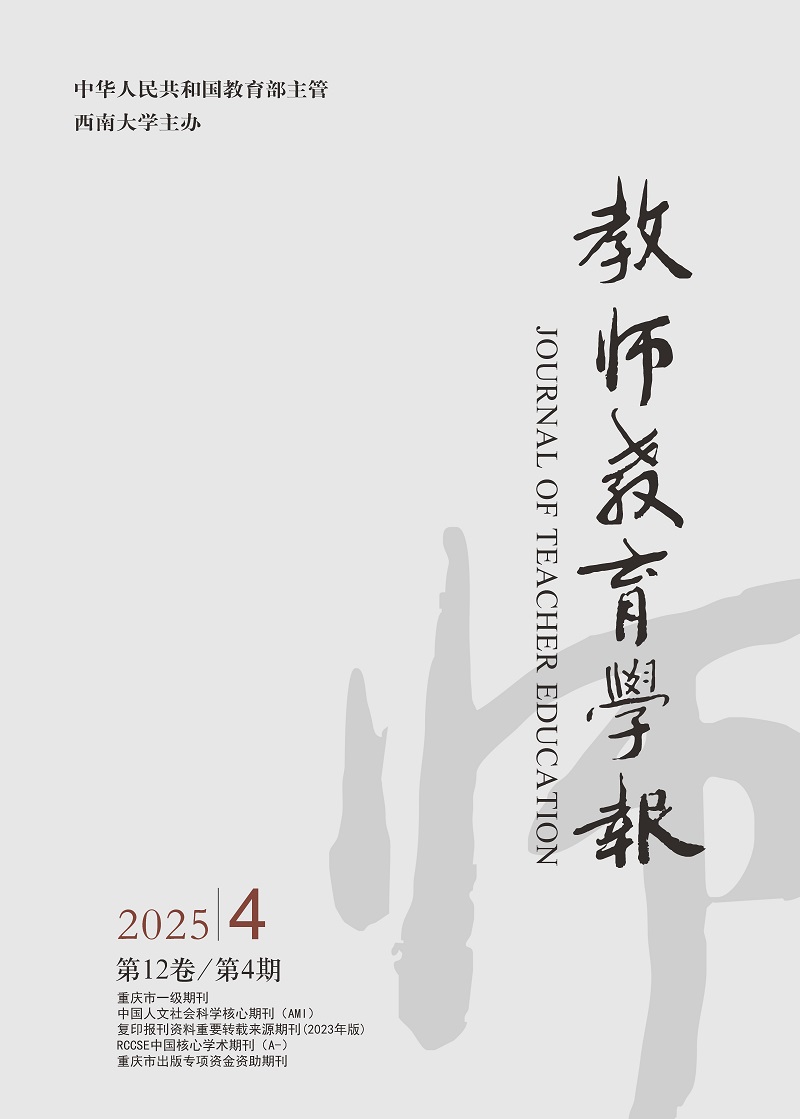|
[1]
|
朱新秤.教育管理心理学[M].北京:中国人民大学出版社,2008:56.
Google Scholar
|
|
[2]
|
李广,盖阔.中小学教师职业幸福感调查[J].教育研究,2022(2):13-28.
Google Scholar
|
|
[3]
|
王钢.幼儿教师职业幸福感研究[M].北京:科学出版社,2018:11.
Google Scholar
|
|
[4]
|
HOCHSCHILDA R.The managed heart:commercialization of human feeling[M].Berkeley:University of California Press,2012:37.
Google Scholar
|
|
[5]
|
GRANDEY A A.Emotion regulationin the workplace:a new way to conceptualize emotional labor[J].Journal of Occupational Health Psychology,2000,5(1):95-110.
Google Scholar
|
|
[6]
|
尹坚勤,吴巍莹,张权,等.情绪劳动对幼儿园教师的意义:一项定量研究[J].华东师范大学学报(教育科学版),2019(6):109-122.
Google Scholar
|
|
[7]
|
HOBFOLL S E.Theinfluence of culture,community,and the nested-selfinthestressprocess:advancingconservation ofresourcestheory[J].Applied Psychology,2001,50(3):337-421.
Google Scholar
|
|
[8]
|
丁先存,郑飞鸿.情绪劳动对离职倾向的影响效应研究---基于工作满意度的中介效应模型[J].华东经济管理,2016(6):144-151.
Google Scholar
|
|
[9]
|
余凤燕,郑富兴.因果机制与管理路径---国外教师情绪劳动研究综述[J].比较教育学报,2021(6):101-115.
Google Scholar
|
|
[10]
|
卫少迪,关金凤,王淑敏,等.幼儿教师职业认同、情绪劳动与职业幸福感的关系[J].中国健康心理学杂志,2021(9):1367-1371.
Google Scholar
|
|
[11]
|
ZAPF D.Emotion work and psychological well-being:a review of the literature and some conceptual considerations[J].Human Resource Management Review,2002,12(2):237-268.
Google Scholar
|
|
[12]
|
马淑蕾,黄敏儿.情绪劳动:表层动作与深层动作,哪一种效果更好?[J].心理学报,2006(2):262-270.
Google Scholar
|
|
[13]
|
YIN H B,LEEJ C,ZHANG Z H,etal.Exploringtherelationship among teachers' emotional intelligence,emotional labor strategies and teaching satisfaction[J].Teachingand Teacher Education,2013,35:137-145.
Google Scholar
|
|
[14]
|
HOY W K,CLOVER S I.Elementary school climate:a revision of the OCDQ[J].Educational Administration Quarterly,1986,22(1):93-110.
Google Scholar
|
|
[15]
|
王潇,李文忠,杜建刚.情绪感染理论研究述评[J].心理科学进展,2010(8):1236-1245.
Google Scholar
|
|
[16]
|
KELLYJ R,BARSADES G.Mood and emotions in small groups and work teams[J].Organizational Behavior and Human Decision Processes,2001,86(1):99-130.
Google Scholar
|
|
[17]
|
LAVIAN R H.The impact of organizational climate on burnout among homeroom teachers and special education teachers (full classes/individual pupils) in mainstream schools[J].Teachersand Teaching,2012,18(2):233-247.
Google Scholar
|
|
[18]
|
GHAVIFEKR S,PILLAI N S.The relationship between school's organizational climate and teacher's job satisfaction:Malaysianexperience[J].Asia Pacific Education Review,2016,17(1):87-106.
Google Scholar
|
|
[19]
|
赵雪艳,游旭群,秦伟.中学教师情绪劳动策略与职业幸福感的关系:基于潜在剖面分析[J].华东师范大学学报(教育科学版),2023(1):16-24.
Google Scholar
|
|
[20]
|
CROSSMAN A,HARRIS P.Job satisfaction of secondary school teachers[J].Educational Management Administration&Leadership,2006,34(1):29-46.
Google Scholar
|
|
[21]
|
李爱梅,王笑天,熊冠星,等.工作影响员工幸福体验的"双路径模型"探讨---基于工作要求-资源模型的视角[J].心理学报,2015(5):624-636.
Google Scholar
|
|
[22]
|
廖化化,颜爱民.情绪劳动的效应、影响因素及作用机制[J].心理科学进展,2014(9):1504-1512.
Google Scholar
|
|
[23]
|
DEMEROUTI E,BAKKER A B,NACHREINER F,et al.Thejobdemands-resources model of burnout[J].Journal of Applied Psychology,2001,86(3):499-512.
Google Scholar
|
|
[24]
|
WRIGHT T A,CROPANZANO R.Emotional exhaustion as a predictor of job performance and voluntary turnover[J].Journal of Applied Psychology,1998,83(3):486-493.
Google Scholar
|
|
[25]
|
林娇娇.幼儿园教师情绪劳动与职业自我效能感的关系研究[D].上海:华东师范大学,2016:24-29.
Google Scholar
|
|
[26]
|
王钢.幼儿教师职业幸福感[M].北京:科学出版社,2018:13-17.
Google Scholar
|
|
[27]
|
HOY W K,CLOVER S I.Elementary school climate:a revision of the OCDQ[J].Educational Administration Quarterly,1986,22(1):93-110.
Google Scholar
|
|
[28]
|
李晓巍,王萍萍,魏晓宇.幼儿园组织气氛的测量及与教师教学效能感的关系[J].教师教育研究,2017,29(04):60-66+83.
Google Scholar
|
|
[29]
|
HAYES A F.Introductionto mediation,moderation,and conditional process analysis:a regression-based approach[M].New York:Guilford Press,2013:75.
Google Scholar
|
|
[30]
|
温忠麟,叶宝娟.中介效应分析:方法和模型发展[J].心理科学进展,2014(5):731-745.
Google Scholar
|
|
[31]
|
王钢.幼儿教师职业幸福感[M].北京:出版社,2018:32.
Google Scholar
|
|
[32]
|
邓涛,邵一笛,叶梦新,等.教师社会幸福感现状及提升策略---基于全国33590名中小学教师的调查与分析[J].教师教育学报,2022(1):47-58.
Google Scholar
|
|
[33]
|
文英,张树东.特殊教育教师情绪劳动和职业幸福感的关系---心理资本的中介作用[J].现代特殊教育,2020(14):19-25,46.
Google Scholar
|
|
[34]
|
安丹丹,张小永.幼儿教师情绪劳动与职业幸福感的关系:情绪耗竭和社会支持的作用[J].心理技术与应用,2020(10):577-588.
Google Scholar
|
|
[35]
|
卫少迪,关金凤,王淑敏,等.幼儿教师职业认同、情绪劳动与职业幸福感的关系[J].中国健康心理学杂志,2021(9):1367-1371.
Google Scholar
|
|
[36]
|
赵雪艳,游旭群,秦伟.中学教师情绪劳动策略与职业幸福感的关系:基于潜在剖面分析[J].华东师范大学学报(教育科学版),2023(1):16-24.
Google Scholar
|
|
[37]
|
肖丽君.幼儿教师情绪劳动、情绪智力与工作绩效的关系研究[D].长沙:湖南师范大学,2012:76.
Google Scholar
|
|
[38]
|
BASIM H N,BEGENIRBAŞM,YALÇIN R C.Effects of teacher personalities on emotional exhaustion:mediating role of emotional labor[J].Educational Sciences:Theory and Practice,2013,13(3):1488-1496.
Google Scholar
|
|
[39]
|
廖化化,颜爱民.情绪劳动的效应、影响因素及作用机制[J].心理科学进展,2014(9):1504-1512.
Google Scholar
|
|
[40]
|
CHEUNG F,LUN V M C,CHEUNG M W.Emotional labor and occupational well-being:latent profile transition analysis approach[J].Frontiers in Psychology,2018,9:1084.
Google Scholar
|
|
[41]
|
叶澜.教师角色与教师发展探析[M].北京:教育科学出版社,2005:267.
Google Scholar
|






 DownLoad:
DownLoad: